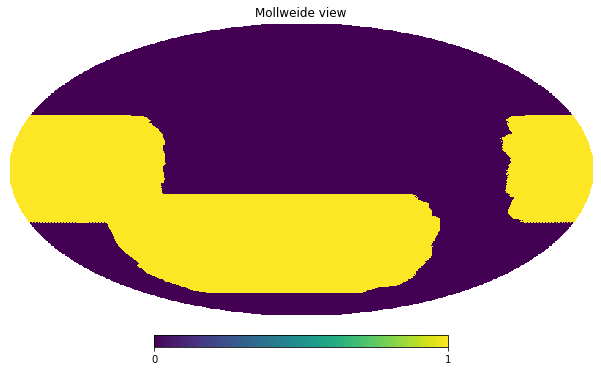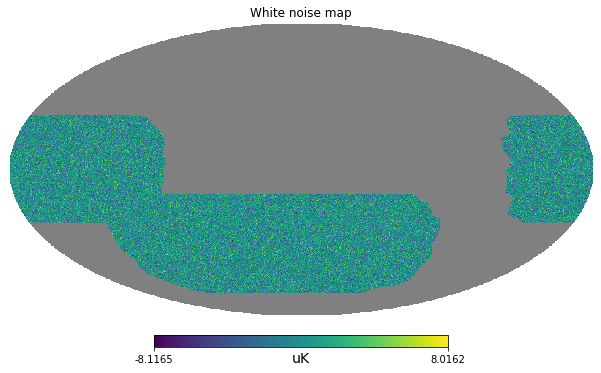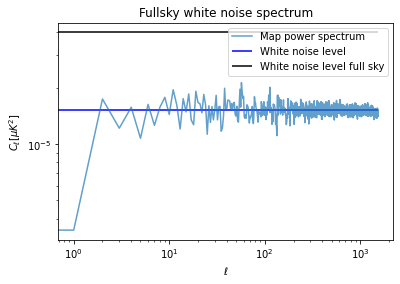import healpy as hp
import numpy as np
%matplotlib inline
import matplotlib.pyplot as plt
import astropy.units as u
hp.disable_warnings()In this second notebook, we will handle a case of partial sky coverage.
# Number based on Simons Observatory SAT UHF1 array of detectors
net = 10. * u.Unit("uK * sqrt(s)")5 years with a efficiency of 20%:
integration_time_total = 5 * u.year * .2Download a hitmap
We can download a simulated hitmap for a Simons Observatory band, for now however, we assume a uniform coverage.
hitmap_url = "https://portal.nersc.gov/project/sobs/so_mapsims_data/v0.2/healpix/ST0_UHF1_01_of_20.nominal_telescope_all_time_all_hmap.fits.gz"!wget $hitmap_url--2020-12-11 10:32:00-- https://portal.nersc.gov/project/sobs/so_mapsims_data/v0.2/healpix/ST0_UHF1_01_of_20.nominal_telescope_all_time_all_hmap.fits.gz
Resolving portal.nersc.gov (portal.nersc.gov)... 128.55.206.24, 128.55.206.26
Connecting to portal.nersc.gov (portal.nersc.gov)|128.55.206.24|:443... connected.
HTTP request sent, awaiting response... 200 OK
Length: 3212515 (3.1M) [application/x-gzip]
Saving to: ‘ST0_UHF1_01_of_20.nominal_telescope_all_time_all_hmap.fits.gz.8’
ST0_UHF1_01_of_20.n 100%[===================>] 3.06M 3.12MB/s in 1.0s
2020-12-11 10:32:06 (3.12 MB/s) - ‘ST0_UHF1_01_of_20.nominal_telescope_all_time_all_hmap.fits.gz.8’ saved [3212515/3212515]
hitmap = hp.read_map("ST0_UHF1_01_of_20.nominal_telescope_all_time_all_hmap.fits.gz")hitmap = hitmap > 0hp.mollview(hitmap)
Uniform partial sky survey
As a reference, let’s first start with the trivial case of uniform full sky coverage, i.e. we spend the same amount of observation time in each pixel.
nside = 512
npix = hp.nside2npix(nside)
npix_hit = hitmap.sum()standard_deviation_per_pixel = (net / np.sqrt(integration_time_total/npix_hit)).decompose()standard_deviation_per_pixelm = np.nan * np.ones(npix, dtype=np.double) * standard_deviation_per_pixel.unitm[hitmap] = np.random.normal(scale = standard_deviation_per_pixel.value, size=npix_hit) * standard_deviation_per_pixel.unitm = m.to(u.uK)m.value[np.isnan(m)] = hp.UNSEENhp.mollview(m, unit=m.unit, title="White noise map")
Power spectrum
sky_fraction = np.mean(hitmap)cl = hp.anafast(m) / sky_fractioncl[100:].mean()1.5205726153293572e-05m[hitmap].std()pixel_area = hp.nside2pixarea(nside)white_noise_cl = (standard_deviation_per_pixel**2 * pixel_area).to(u.uK**2)white_noise_clwhite_noise_cl_full_sky = 3.9820426e-5 * u.uK**2plt.figure(figsize=(6,4))
plt.loglog(cl, label="Map power spectrum", alpha=.7)
plt.hlines(white_noise_cl.value, 0, len(cl), color="blue",
label="White noise level")
plt.hlines(white_noise_cl_full_sky.value, 0, len(cl),
label="White noise level full sky")
plt.title("Fullsky white noise spectrum")
plt.legend()
plt.xlabel("$\ell$")
plt.ylabel("$C_\ell [\mu K ^ 2]$");
white_noise_cl / white_noise_cl_full_skysky_fraction0.38526121775309247